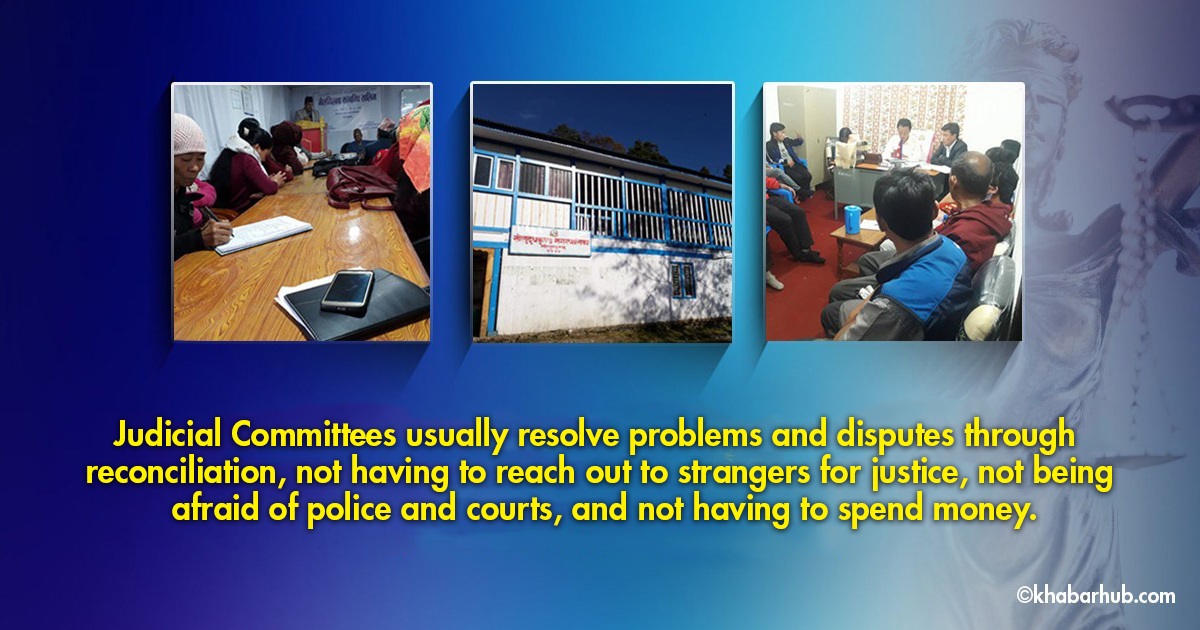SOLU: Rasmita Kulung (name changed) of Mahakulung Gaonpalika-1 of Solukhumbu district had to endure violence from her husband for quite a long time.
Despite suffering from domestic violence, justice was not within her reach.
For people of that region, it takes more than two days to reach the district headquarters costing more than 10 thousand rupees. Lodging a complaint with the police in the village will lead to another problem as there are chances of police thrashing the husband.
For her, the best place to lodge her complaint was at the Judicial Committee, coordinated by one of the sisters of the village. She approached the JC. Says Rasmita, “No money was spent. The JC coordinator summoned us, and talked to us. We reconciled creating a win-win situation. Now, he seems not to deviate from his stance as he does not make any sort of violent activities.”
Rasmita’s case is just an example. The Judicial Committee of Mahakulung Village Municipality has settled five such cases related to domestic violence in the fiscal year 2076/77 BS. Of the 17 cases registered in a year, other cases include compensation, recovery of money, the return of occupancy, and a ban on road construction.
A geographically difficult region and far from the district headquarters, people of Mahakulung suffering from injustice due to lack of judicial access. Now with the establishment of JC, people have been experiencing relief.
Judicial Committee settling disputes
According to the Local Government Operation Act, 2074 BS, the Judicial Committee under the local level can resolve 12 types of disputes through conciliation. The JC has also been entrusted to give a verdict to 13 types of disputes.
Cases include unpaid wages; lost or found of pets and domestic animals; not caring or nurturing elderly citizens; not feeding or educating minor children or spouses; house rent or rent facility with amount up to twenty-five hundred thousand annually; planting trees affecting other’s property or house; leaking or throwing water from one’s house or balcony to other’s house, land or public road; and not leaving the area of land to be left as per the law while constructing a house with a window towards the land of the immediate neighbor.
Similarly, restricting the use or causing obstruction to a road being used publicly since ancient times even though it is under the right or ownership of any individual; way out for cattle to pasture for grazing cattle, drain, canal, pond, rest place, cremation site, religious site or any other public location; and other disputes designated by the federal or provincial law to be resolved by the local level are also included.
Disputes which are not resolved amicably are referred to the court.
The Judicial Committee has been seen as an alternative to reconcile at the local level.
Expert on federalism and local governance, Dr. Khimlal Devkota said that the Judicial Committee has been endeavoring to discuss and make reconciliation at the society or village level without making both the parties feel humiliated or compromised.
Psychologists say that lack of access to justice can lead to domestic violence, which in turn can lead to more serious crimes such as suicide.
As a result, local municipalities are becoming more effective in preventing major problems.
Complaints at the Judicial Committee
The number of people opting for JC to solve their problems has been increasing due to the effectiveness of the judicial committee. Reason: JC usually resolves problems through reconciliation, not having to reach out to strangers for justice, not being afraid of police and courts, and not having to spend money.
Complainants to the Judicial Committee say they do not have to be arrested by the police, do not have to go to court and discuss with unaccustomed people. Since both the victim and the perpetrator have their say, the method of reconciliation will be adopted. Therefore, the JC is gaining the trust of late.
Most of the complaints received by the Judicial Committee are related to domestic violence, transactions, theft, etc. Of the 31 complaints registered in Solududhkunda Municipality in the last fiscal year, 11 were related to domestic violence.
According to the municipality, out of 31 complaints received in a year, 15 were related to transactions, one with land acquisition, three with drinking water and one case related to the removal of structures.
There were nine complaints of theft, six of transactions, six of beatings, 10 of abusive language and eight of border oppression in Necha Salyan.
Judicial Committee lack amenities, resources
Deputy Mayor of Soludhudhkund Municipality, Kalpana Rai says the Judicial Committee lacks resources and amenities. “The JC has only one staff,” she said.
Complaint registration, study and reporting to the concerned person have to be dealt with by a single person making it difficult to process complaints in a timely manner.
“Several municipalities do not have separate rooms or benches for Judicial Committees. There is a dearth of manpower that understands the law. The budget is not enough, it is difficult to work on time due to such reasons,” she complains.
Junita Maya Magar, vice-chairperson of Mapya Dudhkoshi Village Municipality, too, has the same story to share. She says, “Staffers do not have enough legal knowledge.”
According to her, discussions on the cases in the vice chairperson’s chamber affect other works. “Moreover, we have not been able to resolve the disputes due to lack of staff,” she said.
Magar says disputes and other problems can be resolved through reconciliation provided that the Judicial Committee had sufficient manpower and resources.
According to a study by the Nepal Law Society, a complaint needs to be heard at least eight times. It is not possible for a JC to hear more than 32 cases a year if it meets once a week. Lack of manpower and resources has affected the work of judicial committees.
Complaints on domestic violence, border disputes, family quarrels, property, roads and other issues are lodged at the local level Judicial Committee.
JCs have been set up to settle such local disputes at the local level. Due to the lack of resources and manpower, the Judicial Committee has not been able to work as per the people’s expectations.
Capacity of the Judicial Committee
Deputy Mayor of Soludhudhkunda Municipality Rai says the problem arises due to the lack of skilled manpower.
Reconciliation should also be based on the current law. A study conducted by the Nepal Law Society in 2075 BS at some local levels in Kavre, Sindhupalchowk, Saptari and Dhading has also raised a question mark on the capacity of the leadership and effectiveness of the Judicial Committee.
The study found that the lack of legal knowledge has adversely affected the smooth function of the JC. It has also pointed out the need for capacity building training to enhance the effectiveness of the Judicial Committee. The study found that most of the local governments did not formulate JC procedures due to which 90 percent of the cases decided by the judicial committee were overturned by the district courts.
Politicization in justice
The Nepal Law Society has also raised serious concern over the fairness and credibility of the judicial practice.
The study has also revealed the fact that there has been political pressure in some cases because of which it has been difficult to maintain impartiality.
Rai, the Deputy Mayor of Soludhudhkunda Municipality, admits this.
She says, “After the conciliation and decision of the JC, it should be approved by the municipal executive. However, since there are people from different parties, the issue, and the pros and cons are looked at in terms of political affiliation.”
In some cases, allegations are that the decisions have been made on the basis of political influence.
According to her, the political involvement of the deputy mayor or vice-chairperson, no matter how fair, is discussed both at the executive as well as outside of it.
Justice in the COVID-19 period
The justice sector is no exception to the COVID-19 pandemic. In the last eight months or so since the lockdown was imposed in March, police did not entertain complaints in some cases – such as domestic violence. Court services had remained closed. People from organizations facilitating justice remained indoors because of which people were compelled to endure injustice.
Deputy Mayor of Soludhudhkunda Municipality Kalpana Rai says there were some new problems during the COVID-19 period, especially during the lockdown.
According to her, a person returning from abroad were staying in quarantine as per the rules. However, when he reached home, the neighbors began misbehaving with his wife and children. Likewise, domestic disputes escalated as the source of income was stopped due to the lockdown.
Due to the risk of corona infection, victims even could not reach the JC with their complaints. Ironically, some complaints had to be settled in the hospitals.
Despite having some problems in the JC, people considered it as the easiest and safest access for justice. During the lockdown, as many as 13 complaints were registered at the Mahakulung Municipality.
Thirteen complaints were registered in Soludhudhkunda Municipality and seven in Mapyadudhkoshi Municipality.
Bipana Kulung, the vice-chairperson of Mahakulung Village Municipality, said they discussed issues and cases at the Judicial Committee by adopting all health safety measures despite the fear of lockdown and coronavirus infection.
The Corona pandemic resulted in several economic and educational crisis.
The Judicial Committee at the local level seems to be extremely effective in resolving disputes through reconciliation and preventing further embarrassment.
It is, therefore, necessary to provide efficient manpower, adequate budget and other resources in the judicial committees and to prevent political influence in the administration of justice.









Comment